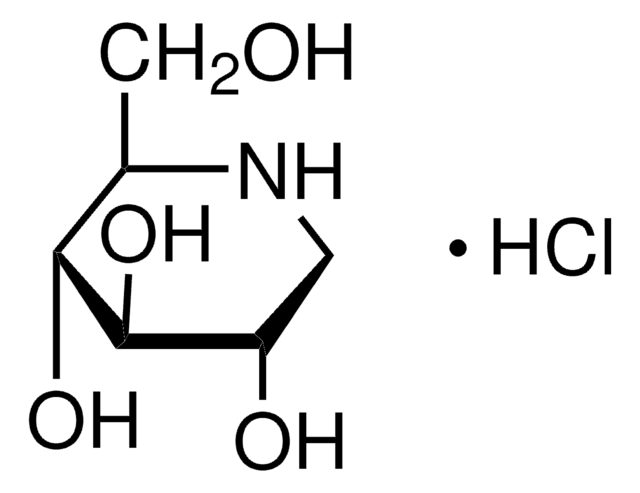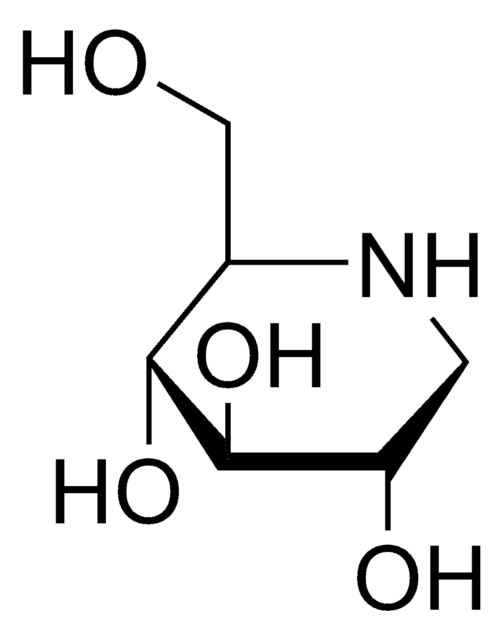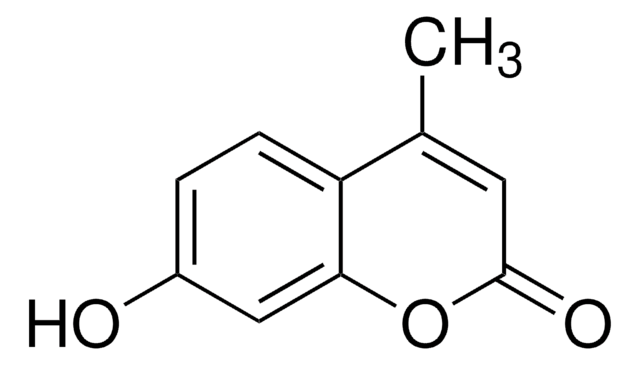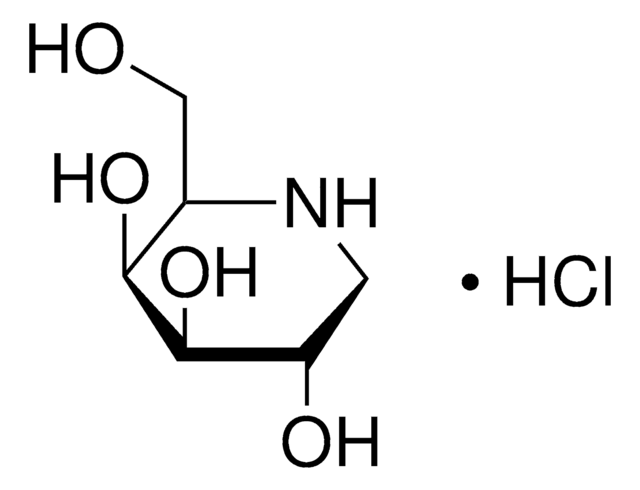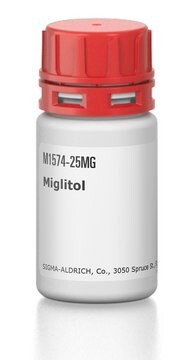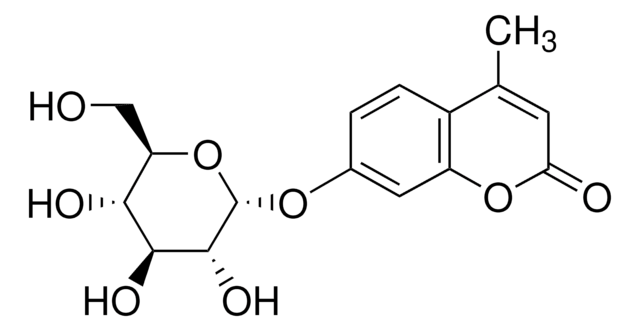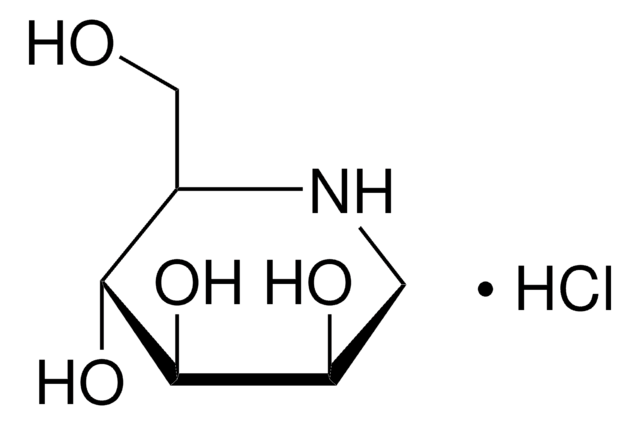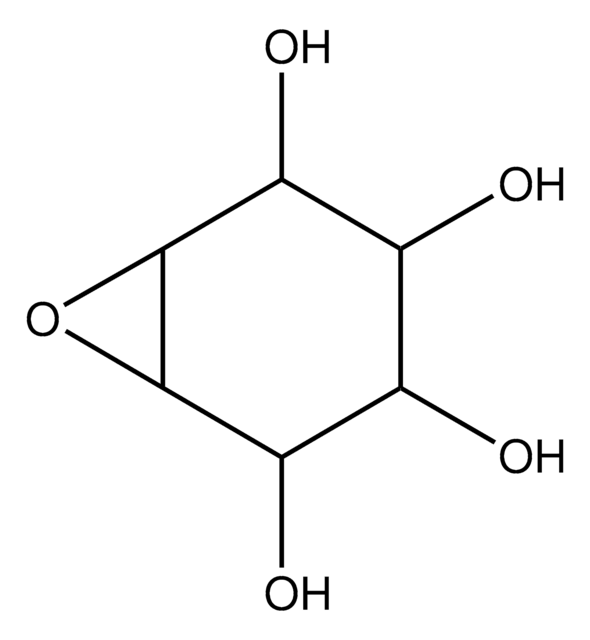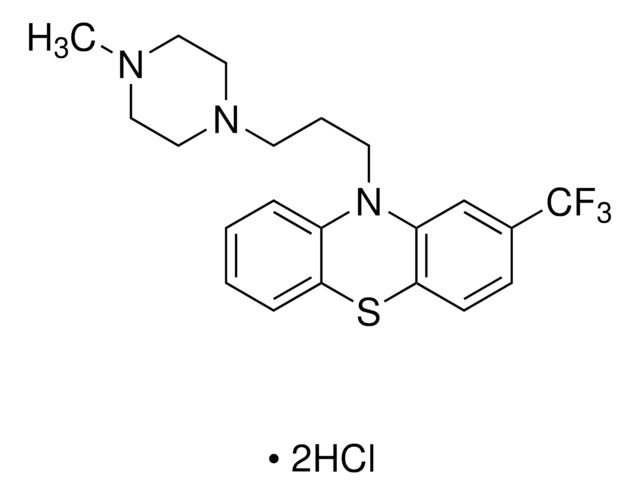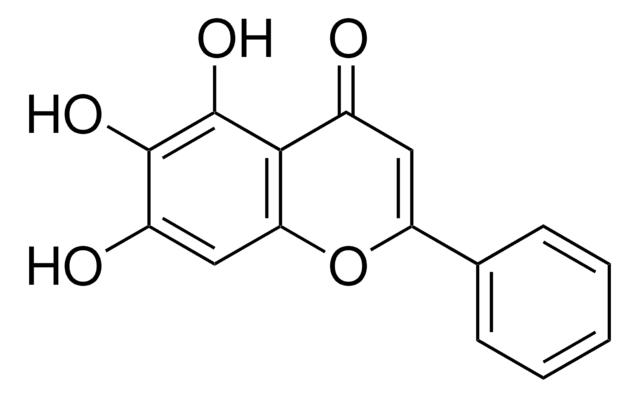B8299
N-Butyldeoxynojirimycin
film (dried in situ)
Sinónimos:
Miglustat, NB-DNJ
Iniciar sesiónpara Ver la Fijación de precios por contrato y de la organización
About This Item
Fórmula empírica (notación de Hill):
C10H21NO4
Número de CAS:
Peso molecular:
219.28
Número MDL:
Código UNSPSC:
12352200
ID de la sustancia en PubChem:
NACRES:
NA.32
Productos recomendados
Ensayo
≥98% (TLC)
Nivel de calidad
Formulario
film (dried in situ)
solubilidad
water: 9.80-10.20 mg/mL, clear, colorless
temp. de almacenamiento
2-8°C
cadena SMILES
CCCCN1C[C@H](O)[C@@H](O)[C@H](O)[C@H]1CO
InChI
1S/C10H21NO4/c1-2-3-4-11-5-8(13)10(15)9(14)7(11)6-12/h7-10,12-15H,2-6H2,1H3/t7-,8+,9-,10-/m1/s1
Clave InChI
UQRORFVVSGFNRO-UTINFBMNSA-N
Información sobre el gen
human ... UGCG(7357)
Categorías relacionadas
Descripción general
N-Butyldeoxynojirimycin is an alkylated product of imino sugar deoxynojirimycin.
Aplicación
N-Butyldeoxynojirimycin has been used:
- in the inhibition of glycolipid synthesis in neuroblastoma cells
- in the inhibition the ceramide-specific glycosyltransferase in hepatocytes
- in the inhibition of β-glucosidase (GBA2) using fluorescence- activity assay in human embryonic kidney (HEK293) cells.
Acciones bioquímicas o fisiológicas
N-Butyldeoxynojirimycin is an inhibitor of glucosyltransferase and α-glucosidases. N-Butyldeoxynojirimycin, also known as misglustat, reduces glycolipid levels by substrate reduction therapy (SRT) and is effectively used for the treatment of glycosphingolipid lysosomal storage disorder, Gaucher disease.
α-glucosidase Inhibitor
Código de clase de almacenamiento
11 - Combustible Solids
Clase de riesgo para el agua (WGK)
WGK 3
Punto de inflamabilidad (°F)
Not applicable
Punto de inflamabilidad (°C)
Not applicable
Equipo de protección personal
Eyeshields, Gloves, type N95 (US)
Elija entre una de las versiones más recientes:
¿Ya tiene este producto?
Encuentre la documentación para los productos que ha comprado recientemente en la Biblioteca de documentos.
Los clientes también vieron
Beom Hee Lee et al.
Medicine, 96(45), e8492-e8492 (2017-11-16)
Gaucher disease (GD) is caused by a deficiency in the lysosomal enzyme glucocerebrosidase. Enzyme replacement therapy (ERT) is recommended for clinical improvement. The efficacy and safety of a new imiglucerase, Abcertin, were assessed in 7 Egyptian patients with treatment-naïve type
Frances M Platt et al.
Nature reviews. Disease primers, 4(1), 27-27 (2018-10-03)
Lysosomal storage diseases (LSDs) are a group of over 70 diseases that are characterized by lysosomal dysfunction, most of which are inherited as autosomal recessive traits. These disorders are individually rare but collectively affect 1 in 5,000 live births. LSDs
Arunabha Ghosh et al.
Orphanet journal of rare diseases, 12(1), 117-117 (2017-06-28)
Mucopolysaccharidosis type III is a progressive, neurodegenerative lysosomal storage disorder for which there is currently no effective therapy. Though numerous potential therapies are in development, there are several challenges to conducting clinical research in this area. We seek to make
Cytoskeletal inhibitors, anti-adhesion molecule antibodies, and lectins inhibit hepatocyte spheroid formation
Nakamura M, et al.
Acta Medica Okayama, 56(1), 43-50 (2002)
The role of the iminosugar N-butyldeoxynojirimycin (miglustat) in the management of type I (non-neuronopathic) Gaucher disease: a position statement
Cox TM, et al.
Journal of inherited metabolic disease, 26(6), 513-526 (2003)
Nuestro equipo de científicos tiene experiencia en todas las áreas de investigación: Ciencias de la vida, Ciencia de los materiales, Síntesis química, Cromatografía, Analítica y muchas otras.
Póngase en contacto con el Servicio técnico